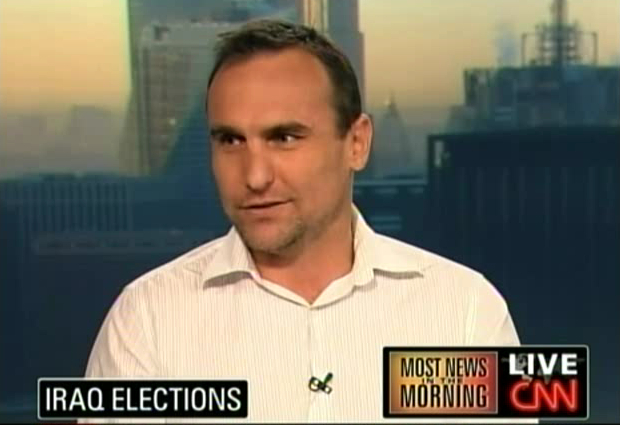AAM: "These parties are waiting to see what they're going to get out of the process."

Length: 2:11
LARGE (30.3 MB) ----- SMALL (2.7 MB)
Michael talks to Kiran Chetry about the weekend elections in Iraq and what they might signal for the future.
KIRAN CHETRY: Well, Iraqi authorities say that half of the country's voters turned out for last week's election. Seven and a half million people. It's a stark contrast to the 2005 elections when violence and intimidation meant only two percent voted. Preliminary results are expected later this week.
For more, we turn to CNN Baghdad correspondent Michael Ware. We're talking about these elections taking place and also what we've seen as a pretty big reduction in violence.
MICHAEL WARE, CNN CORRESPONDENT: Oh, absolutely now, but there's a lot of reasons for this. And first and foremost what we have to consider is that yes, you have this electoral process that is under way. And remember, this is for the provinces, this is state by state. This is voting for the Arnold Schwarzeneggers of Iraq.
What's happening is all the key political parties in Iraq are playing the political game, but don't forget every one of these parties -- because you're not in politics without this -- has their own paramilitary force or army behind them. So these parties are waiting to see what they're going to get out of the process. And if one of the big parties doesn't get what it thinks it's due, that's when we can see a return to violence.
So for the rest of the year when we have an election at the end of the year, for the president and the prime minister and the national government, we're going to see a lot of politicking going on and I think we'll see less violence but that's a bubble of nonviolence that President Obama is going to have to maximize. Particularly while he's waging war in Afghanistan.
CHETRY: So what are the biggest challenges moving ahead then for Iraq?
WARE: For Iraq, it's going to be getting these political factions to accept the voice of the people. For what it is. Now, 51 percent of the vote turned out, that's less than many had hoped for, but hey, that's still 51 percent. There also seems to be from exit polls -- for what they are in Iraq; I mean, come on, we're talking about Iraq here -- it seems to indicate that people were moving away from sectarianism, they're not voting so much for religious parties. We're seeing the Prime Minister trying to shore up his position. Some people accuse him of trying to be a mini-Saddam. Right now, it's in America's interest to back that mini-Saddam.
CHETRY: All right. Michael Ware for us. You've seen it all first hand and you'll be watching of course with interest. Thanks so much for joining us this morning.
WARE: Thanks, Kiran.
